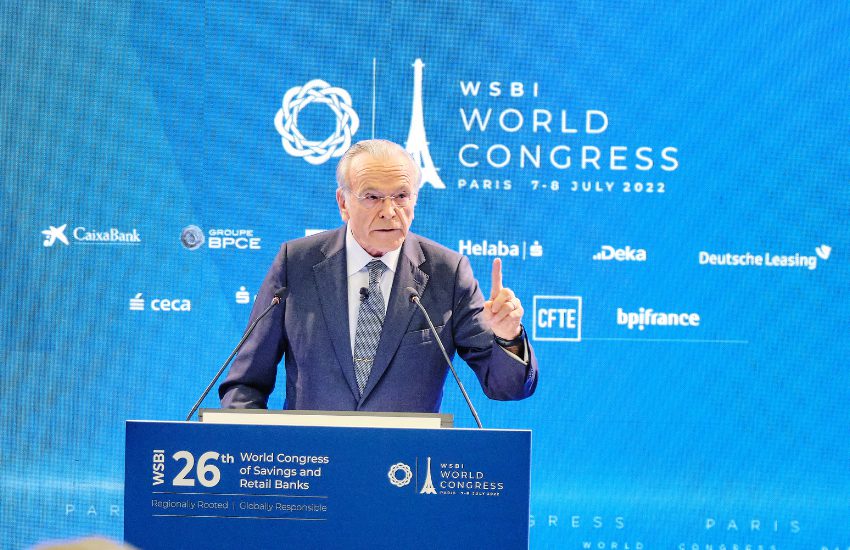The WSBI brings together more than 6,000 savings and retail banks from 65 countries serving nearly 2 billion customers worldwide
During the meeting, the Paris Declaration 2022 was approved, a document that calls for the promotion of sustainable finance to ensure the economic resilience of the communities in which they operate
The World Savings and Retail Banking Institute (WSBI), chaired by Isidro Fainé and with CECA among its main members, brought its 26th World Congress to a close today in Paris with a focus on progress in the field of sustainable finance in the context of the current complex situation.
The WSBI, established in 1924, represents more than 6,000 savings and retail banks from around the world with total assets of USD 15.6 trillion and serving nearly 2 billion customers, offering financial services mainly to SMEs and families.
During the two-day conference, its members approved the Paris Declaration 2022, a guiding document that calls for the promotion of sustainable finance to ensure the economic resilience of the communities in which they operate. Driven by the global perspective of the WSBI, the statement invites regulators to coordinate and harmonise different taxonomies by providing design principles that foster interoperability and mutual recognition. Such a measure can help promote sustainable cross-border finance as well as reduce compliance costs. Faced with the need for a common language, which facilitates comparability and avoids duplication of efforts, the EU-China Common Ground Taxonomy (CGT) is a promising first step in the right direction.
Isidro Fainé, Chairman of WSBI, of the "la Caixa" Banking Foundation and CECA, opened the meeting by stating that "feeling and acting in a socially responsible manner is inextricably linked to our identity. The fact is that we were created this way, it is part of our DNA, and it is our vocation. All of this translates into our way of banking, which is fundamentally different from other players in the sector and is also profitable, efficient and fair", as he addressed the more than 200 participants from all continents, who gathered in person in Paris for the first time since 2018.
26th Worldwide Congress WSBI “Deep rooting in the community. Globally responsible"
The Paris World Congress was held in the French capital on 7 and 8 July under the title "Rooted in the community. Globally responsible", thus underlining the 3Rs model of WSBI - retail, responsible and rooted - as a necessary strategy to build a more inclusive and sustainable society.
Leading financial experts from different jurisdictions debated on the main issues on the current economic and financial agenda: regulatory harmonisation in sustainable finance; digitalisation and its impact on financial inclusion; and the broad scope of social responsibility in current global environments of recovery and geopolitical change.
The environmentalist and mountaineer Reinhold Messner, who advocates a more sustainable development model and whose foundation helps mountain villages around the world to cope with the consequences of global warming and the negative impact of excessive tourism, gave a keynote lecture on sustainable banking in times of climate change.
Prominent representatives from the international regulatory arena included Mairead McGuinness, Commissioner for Financial Stability, Financial Services and Capital Markets Union of the European Commission, and José Manuel Campa, Chairman of the European Banking Authority. Meanwhile, the Spanish Secretary of State for Digitalisation and AI, Carme Artigas, appeared via video. The Director of Financial Studies at FUNCAS, Santiago Carbó, the Director of Public Affairs at CaixaBank, Christian Castro, the CEO of CECA, José María Méndez, and Shlomo Ben-Ami, Vice-President of the Toledo International Centre for Peace and former Israeli Ambassador to Spain, also attended this triennial meeting.
Promoting financial inclusion, Scale2Save
As a side event of the World Congress, the Scale2Save (S2S) programme was presented, which, after six years of operation, will come to an end on 31 August. This programme, developed by WSBI in partnership with the Mastercard Foundation, was designed to promote financial inclusion through the establishment of basic savings accounts in developing countries and financial education projects, helping to overcome the barriers faced by a large part of the population in these countries in accessing financial services.
With 1,078,000 customers enrolled as of 31 March and a monthly activity rate of 20% over the last twelve months, S2S exceeded its numerical commitment of reaching one million customers.
With a total budget of more than $16 million, S2S was able to implement successful projects in places such as Ivory Coast, Morocco, Nigeria, Kenya, Senegal, Tanzania and Uganda.
CECA and the WSBI: a common business model
CECA is an active member of the international associations - the World Savings and Retail Banking Institute (WSBI) and the European Savings Banks Group (ESBG) - representing the model of retail banking which gives priority to funding for families and SMEs, a model with which CECA member entities feel fully identified.
The link between CECA and the WSBI responds to the task of representing and defending the interests of its member entities, and to this end it is present in national and international forums. The WSBI helps savings and retail banks around the world to thrive. It focuses on international regulatory issues affecting the financial industry and provides a platform for knowledge sharing among member entities.
The Chairman of CECA and the "la Caixa" Banking Foundation, Isidro Fainé, renewed his three-year term as Chairman of the WSBI during the General Assembly held in Paris last November. Among the priority lines of work established for the coming years are financial inclusion, the promotion of sustainable finance and the exchange of best practices in the implementation of the new solvency framework and innovation, with an eye to digitalisation as a tool to improve customer proximity. Now, the Paris Declaration 2022 reinforces this path set by the international body a year earlier.









